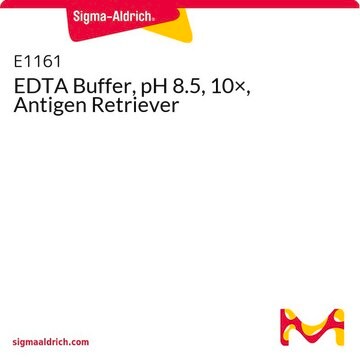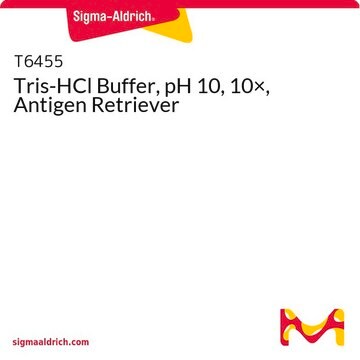R2283
Pepsin Reagent, Ready to Use, Antigen Retriever
suitable for immunohistochemistry
Synonym(s):
pepsin
Sign Into View Organizational & Contract Pricing
All Photos(1)
About This Item
UNSPSC Code:
12171500
NACRES:
NA.47
Recommended Products
Application
Pepsin is used for proteolytic digestion of formalin-fixed paraffin-embedded (FFPE) tissue sections prior to application of antibodies in immunohistochemistry (IHC).
Pepsin is used for proteolytic digestion of formalin-fixed paraffin-embedded (FFPE) tissue sections prior to application of antibodies. In immunohistochemistry (IHC), most commonly used fixatives such as formalin mask tissue antigens (cellular, membrane, and nuclear) by their intrinsic crosslinking. This masking results in poor or no staining in IHC. Pepsin digestion of FFPE tissue sections improves accessibility of antibodies to tissue antigens. Ready to use pepsin reagent, antigen retriever has been used for antigen unmasking in immunohistochemistry.
Signal Word
Warning
Hazard Statements
Precautionary Statements
Hazard Classifications
Skin Sens. 1
Storage Class Code
12 - Non Combustible Liquids
WGK
WGK 3
Flash Point(F)
Not applicable
Flash Point(C)
Not applicable
Choose from one of the most recent versions:
Already Own This Product?
Find documentation for the products that you have recently purchased in the Document Library.
Customers Also Viewed
Fetal testis organ culture reproduces the dynamics of epigenetic reprogramming in rat gonocytes.
Rwigemera A, et al.
Epigenetics & Chromatin, 10(1), 19-19 (2017)
The effect of low doses of cadmium and zinc chloride on the Blood-Testis Barrier of Sprague Dawley rats.
Redondo A, et al.
arXiv (2012)
Codistribution of collagen type IV and laminin in liver fibrosis of elderly cadavers: immunohistochemical marker of perisinusoidal basement membrane formation.
Mak Ki M, et al.
The Anatomical Record, 296(6)A, 953-964 (2013)
M Bekhouche et al.
Journal of materials chemistry. B, 8(36), 8422-8432 (2020-08-18)
Hydrogel-based regenerative endodontic procedures (REPs) are considered to be very promising therapeutic strategies to reconstruct the dental pulp (DP) tissue in devitalized human teeth. However, the success of the regeneration process is limited by residual bacteria that may persist in
Elizabeth Vinod et al.
Acta histochemica, 122(1), 151462-151462 (2019-11-18)
Interest in chondroprogenitors arose due to their inherent stem cell like properties, and their initial characterization was based on identification of a small percentage of CD49e positive cells in cultured chondrocytes (CC). It was further noted that when fresh chondrocytes
Our team of scientists has experience in all areas of research including Life Science, Material Science, Chemical Synthesis, Chromatography, Analytical and many others.
Contact Technical Service










